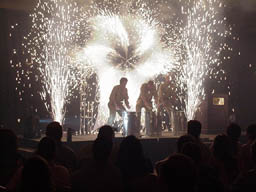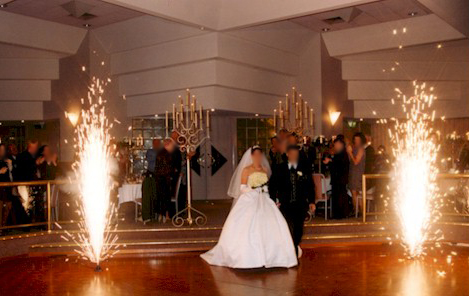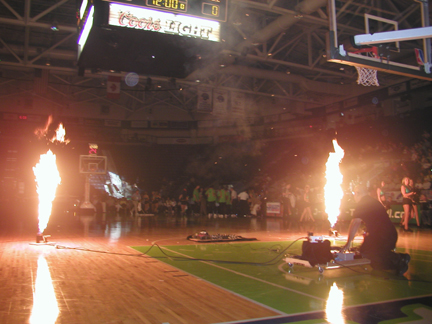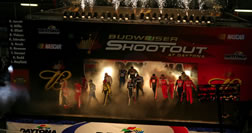
Zigmont Magic FX Inc 813 689 6269 zigmont@zigmont.com
When everyone
else tells says there is not enough room,
call us and we will show you how spectacular a Low Level close proximity show
can be.
It is our mission
at Magic F/X to provide our clients with the
best in low level fireworks displays. We handle all types of explosive materials,
so naturally, we come under the scrutiny of many Federal, State, and local authorities,
each with their own set of demanding requirements. We are licensed by the Bureau
of Alcohol, Tobacco & Firearms and the State Fire Marshal's Office. We always
obtain display permits from your local Fire Marshal office we abide by National
Fire Protection Association standards and we do what our insurance company says.
Our primary concern is for the safety of our clients and our employees. As such,
we take every possible precaution and we ask our clients to respect and obey
the rules under which we must work.
You provide the firing
site, hotel ballroom, convention center, stadium stage,
proper security and an appreciative audience, and we will do the rest. We pull
all permits, provide a million dollar liability insurance policy with you listed
as an additional insured, and bring all the other logistical aspects together
for a spectacular show for you.
Safety Perimeter
& Fallout Area
Each firework display has a specific bit of real estate called the "Fallout
Area" which is contained within a circle known as the "Safety Perimeter."
Indoor shows we use “Zero Fall-out” effects that are very safe.
Larger shows with the actual firing site typically serving as a center point,
this entire area must be kept clear of structures, vehicles and people, from
the time we arrive until well after the display has concluded. A radius is used
to describe the legal distance and it is 15 to100 feet depending on effects
used. With indoor show we must remove fired effects after they are fired. We
can fire “zero fall-out” effects very close to people, video screens
and sets. We use the most precise in-door effects on the market.
Site Security & Display
For indoor shows we use products that people on stage, hard sets and video screens
are safe audience is not permitted within 15 Feet of any indoor product. Under
outdoor circumstances, we ask our clients to provide private security/police
officers, at their expense, to maintain the security of the fallout area; larger
displays may require greater degrees of security as determined by the local
authority having jurisdiction. If there is a breach in the safety perimeter,
we must, by law, cease all firing until it is resolved. There is no refund if
the display is interrupted or canceled as a result of a security breach.
Magic F/X shoots what we call low level
No longer do you need
a large open field next to a stadium for a fireworks display -- you can have
a "mini" display launched from an end zone, or even right on the fifty
yard line. Or bring the display indoors, right inside the arena or stadium or
even the local shopping mall or convention center.
Want people to stay until a carnival or event closes? Announce fireworks at
closing time! It works for Disney. You can use fireworks to get people to come
to an event, and then to stay until it's over.
Proximate pyrotechnics
are more than just mini fireworks displays. They can be used anytime a bang,
a flash, some beautiful colors are needed near people. They are used for special
effects in theater and film, for bangs, booms, color, and flashes at rock concerts
and sporting events -- they can even be used to spice up a company meeting,
a presentation, a store opening, a product announcement, a sporting event --
anytime you want to make an event special.
Proximate Pyrotechnics typical firing sites are parking lots, roofs of buildings,
stadiums, train stations, and hotels, parks anyplace is a potential firing site.
Magic F/X
shoots three different types of fireworks displays
For a variety of clients. The location and proximity of the audience determines
whether we use pyrotechnics designed for concern.
1- indoor in hotels used close up
2- indoor - stadium type venues
3- low level outdoor or stadium fireworks
We shoot all our displays using electrical ignition. This provides accurate
cuing of effects and provides greater safety for the pyrotechnician. Our controllers
are designed specifically for pyrotechnic use, provide safety lock outs, and
operates off, wall current or batteries.
 |
 |
|
 |
 |
|
 |
 |
|
 |
 |
|
 |
 |
|
 |
 |
The first type of
fireworks is traditional display fireworks. These are known by the Bureau of
Alcohol, Tobacco, and Firearms (BATF) as "special fireworks"; to the
US Department of
Transportation (DOT) as "1.3g" fireworks, by the United Nations transport
authority as UN0335,
and in the fireworks industry as "display fireworks".
Display fireworks are distinctly large. They travel high, explode with great
force, and require
large distances between audiences and the firing site. Display fireworks can
weigh anywhere
from several ounces to tens of pounds, and require setbacks of seventy feet
per inch of firework
diameter. They are not designed for use close to any person or structure.
The second type of
firework is commonly known as "consumer fireworks". BATF refers to
these as "common fireworks", and DOT as 1.4g, with a United Nations
transportation
designation of UN0336. These are the type of firework citizens can purchase
on the roadsides in
some states. They are typically small, foreign-made, distinctly unreliable,
and unpredictable as
to performance. Most types of consumer fireworks are not suitable for close
Proximate displays and need 75ft - 125ft
clearance to use, but for Many years, this was the only 'close proximity' fireworks
available fit into this category.
Now, there is a third
category -- "Articles Pyrotechnic". These are professional small fireworks.
This type of firework carries the same BATF and DOT designations as consumer
fireworks, but
the U.N. recognizes this type as distinctly for professional use. They are designated
UN0431.
This designation carries substantial weight in the professional fireworks trades.
The number
denotes professional use, only.
-------
"Articles Pyrotechnic" are the type now most commonly called "Close
Proximity Pyrotechnics".
The type includes a wide range of effects that are distinctly small, reliable,
and predictable as to
performance. Their characteristics follow:
1) Effects contain grams of explosives per device, rather than pounds in display
goods.
2) Most brands are U.S. or European made, and few brands contain cheap oriental
components.
3) Effects are specifically designed to minimize fallout and burning debris.
Some brands
eliminate fallout.
4) Effects are designed to minimize burst diameters and 'danger zones', for
use in close venues.
5) Setbacks due to noise and fallout are greatly diminished because of size
and performance.
6) Close proximity pyrotechnics pose no mass-detonation hazard -- stores of
close proximity
goods will burn safely in an accidental fire. Therefore, goods may be stored
without using
robust, bulletproof magazines.
7) Traditional display fireworks can rise as much as two thousand feet into
the air. Close
proximity fireworks typically rise a few tens of feet -- at the most one or
two hundred feet,
depending upon effect.
8) Close proximity fireworks 'burst diameter' measures a few feet rather than
hundreds of feet
for display fireworks.
9) Display fireworks may measure as large as two feet in diameter, whereas close
proximity
fireworks are seldom larger than four inches, and typically one to two inches
in size.
10) Display fireworks may never be fired over audiences. Some close proximity
effects are
commonly fired so the effects occur over audiences' heads, because everything
is consumed
in the air, and nothing falls to the ground.
The use of close proximity pyrotechnics is governed by the National Fire Protection
Act code
1126.
"NFPA 1126" covers chemistry, construction, placement, and firing
of close proximity
pyrotechnics.
Notable in
NFPA 1126 are the following:
1) Close proximity pyrotechnics may be placed as close as 15' (fifteen feet)
from audiences or
structures. The rule sets the distance at the greater of 15', or twice the fallout
radius of the
device. Since many close proximity pyrotechnic devices produce no fallout, they
may be
placed as close as 15' to audiences or flammable structures.
2) With limitations on chemistry, certain close proximity pyrotechnics may be used indoors.
3) Chemistry, explosive
weights, fusing and ignition methods are limited by NFPA 1126 in
ways that ensure the greatest in safety for both pyrotechnicians and their audiences.
Because of their small size and lightweight, close proximity pyrotechnics are
easy to secure
against tipping and off-angle firing. Often, this is difficult to achieve with
display fireworks.
But with close proximity goods, effects are small enough that often they can
be glued to the
shooting surface, placed in pre-built 'effect holders', or attached safely with
tape or staples in
ways that would not safely secure display fireworks.
Close proximity pyrotechnics
rely upon relative scales of viewing distance vs. effect sizes to
achieve what appear to be audibly and visually exciting effects with tiny amounts
of explosives.
Because effects can be so close to audiences, miniscule amounts of explosives
can achieve very
entertaining effects.
The net result is
that, 'bang for bang', close proximity pyrotechnics are far safer to both property
and persons than display fireworks, even given the smaller setback distances.
Also, the small
amounts of explosives in close proximity goods mean smaller amounts of smoke
from the
effects. This increases visibility at the shooting site, and improves the comfort
of both crews and
audiences.
Fire marshals having
jurisdiction over close proximity firing sites can work with the confidence
of knowing that close proximity pyrotechnics are far safer and easier to control
than traditional
display fireworks.
Magic F/X will handle all details for your fireworks display
We obtain the permits, cover the event with our million dollar liability insurance,
and provide a crew of trained and licensed pyrotechnic technicians. We integrate
with you to produce a seamless display or provide accents to a corporate meeting
or theatrical performance.
It is very difficult to assess identically priced displays from different sources. Although it is important to compare estimates of proposed material content, showing total numbers and caliber sizes of the fireworks to be used, it is equally important to consider the quality of the fireworks and the expertise and enthusiasm of the operators.
What is Special
Effects/Stage/Event Pyrotechnics?
Any devices or materials that use’s chemical compounds for combustion
and are designed to produce a visual, audible, or thermal effect as enhancement
for stage, film, video, presentations, live events or other public/private events.
These materials are manufactured specifically for the intended use?both indoor
and outdoor, and are approved by the Fire Marshal for such use. What is involved
with permits and licenses?
A local permit from the Fire Department having jurisdiction is required for
every event. Usually a stand by fire watch (A fireman) is also required. The
costs for the local permit and standby varies from city to city.
Where can Pyrotechnics be safely used?
Actually, you would be amazed by the places we use pyrotechnics. Since the materials
are manufactured and scaled for specific proximity usage, we are able to work
inside hotel ballrooms, convention centers, event centers, etc. We can do inside
displays very close to hard sets, props, video screens and actors. In fact just
3 feet away, but always the audience must be 15 feet from any device. The products
from the 5 manufacturers of close proximity pyro that we use are all state of
the art chemical compounds.
What about
insurance?
Magic F/X maintains a full liability policy as prescribed by the State Fire
Marshal. Your company and the venue ? and any other vendors, performers etc,
can be named as additional insured on a certificate that is specific your event.
Magic F/X has NEVER had a claim.
How much does it cost for Pyrotechnic Special Effects?
There are fixed costs for displays and every show is customized and has its
own set of cost factors. Overall budgets begin with the cost of doing business
in each city. Pyrotechnic Special Effects are labor intensive and usually require
a crew. Range of price for typical presentation events are $1800.00 to $6000.00
One?time Film/video and other specialized events can cost less...or more.
What kind of event uses Pyrotechnic Special Effects?
Corporate parties and award meetings, special public events, stage productions,
film/video/still photography, weddings, birthdays, sporting events, and other
private or public celebrations anyone can enhance a presentation with Pyro.
How can I
decide what to do for my show?
Most people usually have an idea, but if you just want to know what’s
possible you should call, fax, or email us. We have 15 years of experience in
theater production.
How much advance notice is necessary?
The more the better, as with all planning. Local fire departments suggest 10
days notice when filing for a permit. In order to do that I must have a complete
and detailed plan, which will take me about a day to generate. We have put shows
together on 48 hours notice but I strongly advise against trying this. In general,
if you contact us 3-6 weeks prior to your date, we can produce a great display
with a minimum of stress.
We are trained specialists,
licensed and certified with continuing education in fireworks safety NFPA 1126.2000
NFPA 160 and 1124 code. Successful completion of a comprehensive written examination
covering this standard and state laws pertaining to the use of pyrotechnic special
effects.
Licensed Low Explosives by;
(1) Licensed State of Ohio Pyrotechnics Operator Certified NFPA 1126.2001
(2) Licensed State of Nevada Pyrotechnics Special Effects Operator Certified
NFPA 1126.2001
(3) Licensed State of Colorado Pyrotechnics Operator Certified NFPA 1126.2001
(4) Licensed State of Texas Pyrotechnic Special Effects Operator Certified NFPA
1126.2001
(5) Licensed City of Lakeland, State of Florida Pyrotechnics Operator Certified
NFPA 1126.1996
(6) Licensed State of Texas Flame (Propane) Effects Operator Certified NFPA
160.2001
(7) Licensed State of Nevada Flame Propane Effects Operator Certified NFPA 160.2001
(8) Certificate of Completion OSHA Electrical Safety 29CFR1910.332
(9) Federal license/Permits with The Bureau of Alcohol, Tobacco, Firearms and
Explosives;
• ATFE 34 - User of Low Explosives
• ATFE 19 - Manufacturer of Binary Explosive
• ATFE 54 - User Fireworks
Let talk about your Live Special FX Event 813 689 6269
Magic FX is owned by Zigmont Magic FX Inc of Tampa Florida
